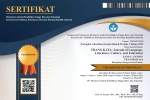Digital Novels: A Recycled Advertisement about the Old Social Construction of Women’s Identity
DOI:
https://doi.org/10.54923/jllce.v3i2.46Keywords:
digital, novel, construction, women, identityAbstract
21st-century digital novels, accessible through mobile apps like Webnovel, Dreame, and Play Books, commonly depict women characters as powerless, impoverished stepdaughters or illegitimate children. These prevalent themes in digital novels often reinforce patriarchal norms and present themes of fathers' financial struggles and indebtedness to wealthy families resulted to contract marriage or planned marriage. Employing the approach of feminist literary criticism, this study aims to examine how these novels uphold antiquated perceptions of women's identity. Through the reading strategy of feminist literary criticism is revealed that these digital novels represented the old construction about women identity, perpetuating the idea that women are powerless and financially dependent on men. From the setting of the novel, we know that the offered themes were not only occurred in eastern culture but also in western culture. They depict women as inanimate objects, lacking agency and voice. The narratives promote patriarchy by portraying male power and oppression as protection, often emphasizing material wealth. This notion is strategically disseminated through digital novels, targeting the millennial generation who have easy access to digital media. Consequently, younger women may internalize these ideas and accept their subjugated role. Instead, digital novels should empower women to navigate patriarchal constraints and depict men who respect and support women's autonomy, challenging traditional gender norms. While the study employs feminist literary criticism as the reading strategy, it's important to acknowledge that different theoretical frameworks or approaches may provide alternative interpretations of the novels. Recognizing the limitations and potential biases of the chosen methodology could lead to a more balanced analysis.
Downloads
References
Asthereni, P. V. (2020). The Representation Of Women In Li Young-Lee’s Poems. Okara: Jurnal Bahasa dan Sastra, 39-50.
Baga, M. (2019). Potret Perempuan pada Sebuah Masa [A Portrait of Women in a Certain Era]. Gorontalo: Ideas Publishing.
Culler, J. (1986). On Deconstruction: Theory and Critcism after Structuralism. New York: Cornell University.
Deepublish. (2020, September 18). Ebook adalah – Pengertian, Kelebihan dan Kekurangannya [Ebooks: Definition, Advantages, and Disadvantages]. Yogyakarta, Yogyakarta, Indonesia.
Djajanegara, S. (2000). Kritik Sastra Feminis: Sebuah Pengantar [Feminist Literary Criticism: An Introduction]. Jakarta: Gramedia Pustaka Utama.
Endraswara, S. (2003). Metodologi Penelitian Sastra [Methodology of Literary Research]. Yogyakarta: Pustaka Widyatama.
Hastuti, D. P., Gunawan, D., & Andriani, R. (2018). Liberal Feminism in Movie North Country Directed by Niki Car. Wanastra, 10(2), 91-104.
Hetami, F. (2012). Transformasi Ideologi Patriarki Dalam Ekranisasi Anna And The King. In Konferensi Internasional Kesusastraan XXII (pp. 41-50). Yogyakarta: UNY-HISKI.
Indriyanto, K. (2018). Locating Digital Literature In World Literature: A Case Of Quarterly Literary Review Singapore. International Journal of Humanity Studies, 22-31.
Mulyani, S., Manggala, S. A., & Nirwinastu, D. G. (2022). “Family” As A Site Of Gender And Class Struggles In Catherine Lim’s The Song Of Silver Frond. Okara: Jurnal Bahasa dan Sastra, 170-194.
Priyanto, I. F., & Sedyaningsih, S. P. (2013). Buku Digital: Kajian Literatur Perkembangan dan Pengaruhnya pada Perpustakaan [Digital Books: A Study of the Development of Literature and Its Influence on Libraries]. FIHRIS, 8(2), 1-12.
Roifah, M., & Eliyanah, E. (2012). Comparing the Women in Madame Bovary and The Awakening: a Study of Women Social Condition and Identity Construction in 19th Century France and America. In Konferensi Internasional Kesusastraan XXII (pp. 31-40). Yogyakarta: UNY-HISKI.
Santoso, H. D. (2022). Women’s Voices in Tiffany Reisz’s The Night Mark (2017). English Language and Literature International Conference (ELLiC) Proceedings (hal. 57-62). Semarang: Faculty Of Foreign Language And Culture Universitas Muhammadiyah Semarang.
Sugianti, I. (2022). Gender Discrimination in Orhan Pamuk’s Snow and Khaled Hosseini’s A Thousand Splendid Suns. Lensa: Kajian Kebahasaan, Kesusastraan, dan Budaya, 8(1), 43-55. doi: 10.26714/lensa.8.1.2018.43-55
Sugihastuti. (2002). Teori dan Apresiasi Sastra [Theory and Appreciation of Literature]. Yogyakarta: Pustaka Pelajar.
Downloads
Published
How to Cite
Issue
Section
License
Copyright (c) 2023 The Author(s)

This work is licensed under a Creative Commons Attribution-ShareAlike 4.0 International License.





